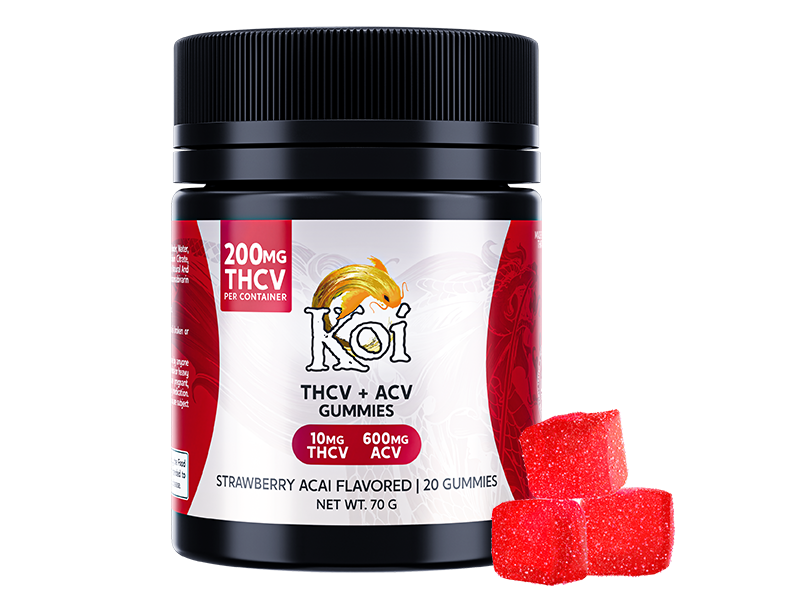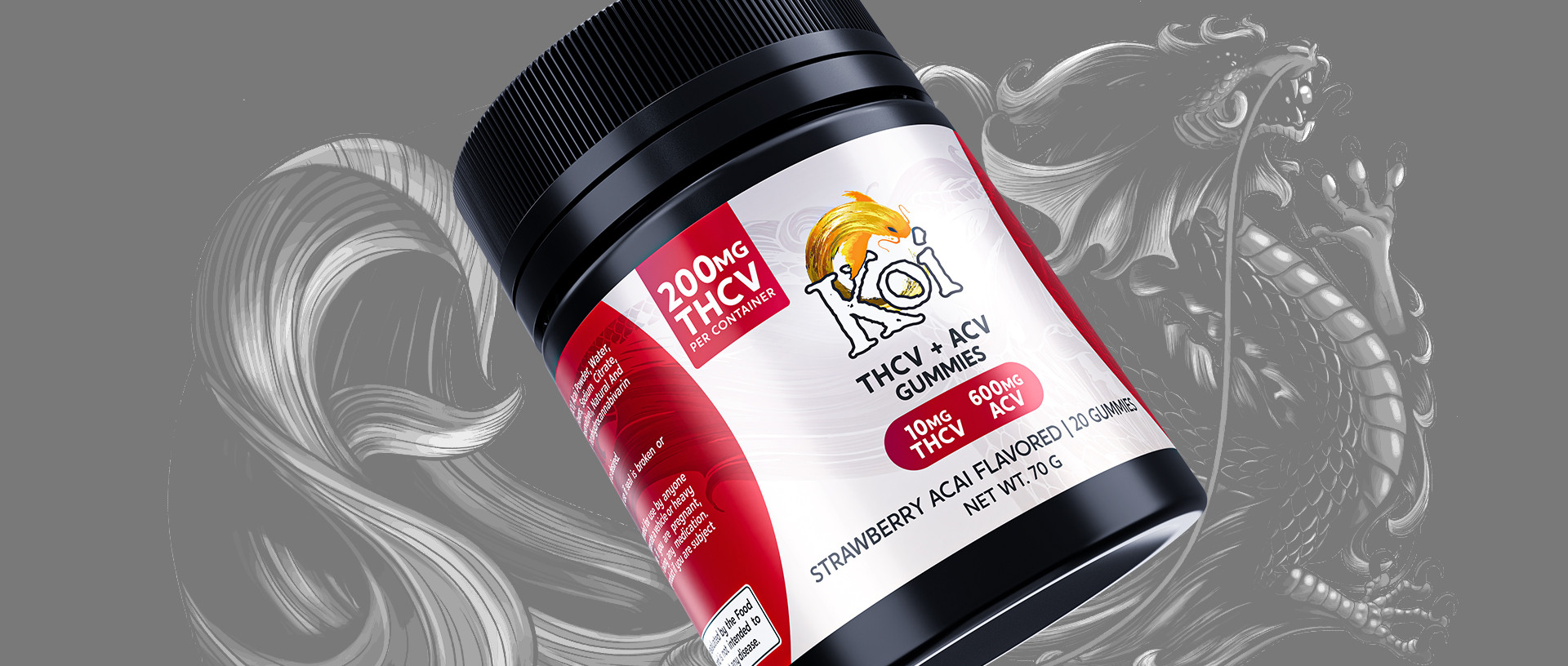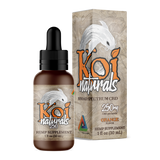Nicknamed the "sports car" of cannabinoids, THCV is sure to be in high demand once the world discovers its full potential.
The benefits of hemp do not start and stop with CBD and delta-8 THC. There are many other exciting cannabinoids you should know -- THCV being one.
THCV is a naturally occurring hemp cannabinoid celebrated for promoting mood and focus while supporting a healthy appetite. THCV is far from new, but only recently has the compound been made available in higher concentrations thanks to THCV products.
Koi is proud to offer our Koi THCV + Apple Cider Vinegar Gummies, and we want to make sure you fully understand how these revolutionary new gummies with THCV can benefit you.

Here, we'll look at THCV in more detail. Learn what THCV is, its benefits and effects, why you should consider adding it to your routine, and where you can buy it.
In This Article:
- What is THCV?
- How Does THCV Work?
- THCV Effects: What is THCV Good For?
- When and How to Take THCV
- Is THCV Psychoactive?
- THCV vs THC: How Do They Differ
- Is THCV Legal?
- Does THCV Show Up on a Drug Test?
- Where to Buy THCV Products
What is THCV?
THCV, short for tetrahydrocannabivarin, is one of the many cannabinoids naturally found in the hemp plant. Outside of a small number of strains, THCV is found in cannabis in only trace amounts.
THCV is recognized most for offering increased energy, enhanced focus, and supporting healthy eating habits. It is generally non-intoxicating unless consumed in high amounts when it can behave much like its THC cousins and produce noticeable uplifting, yet clear-headed, effects.
How Does THCV Work?
Like all cannabinoids, THCV elicits its effects by interacting with the body's endocannabinoid system. This regulatory network -- made up of cannabinoid receptors, neurotransmitters, and enzymes -- plays a key role in maintaining the body's internal balance.
THCV directly interacts with the endocannabinoid system's two receptors, CB1 and CB2.
THCV appears to behave as a CB1 agonist when consumed in small amounts, meaning it prevents the receptor from binding with other compounds. In large amounts, THCV can act as an agonist of CB1 receptors.
With CB2 receptors, THCV acts as an agonist, activating the receptor for numerous health and wellness benefits.
THCV Effects: What is THCV Good For?
THCV is nicknamed the “race car” or “sports car” cannabinoid because it’s known for providing energizing feelings of euphoria that drive motivation and focus. For that reason, it’s a popular daytime choice whenever functionality is important.
THCV is also touted by some for supporting healthy eating habits. Early evidence suggests that lower servings of THCV may block the endocannabinoid system’s CB1 receptor from binding with other compounds. The CB1 receptor is known to stimulate appetite, so preventing its activation could potentially curb unwanted food cravings.
Scientists continue to unveil some exciting findings around THCV and its potential role in supporting and maintaining health. While more research is needed to understand the scope of THCV's benefits, the cannabinoid shows potential for multiple uses.
When and How to Take THCV
Is your to-do list longer than usual today? THCV can be most beneficial at times when you're looking for an energy boost and enhanced focused energy. That’s why most people prefer to take THCV in the morning or during that afternoon lull.
There’s no single THCV serving size that works for everyone. THCV research has yet to define a THCV serving, and due to differences in genetics, body make-up, and tolerance, your perfect serving of THCV can differ from someone else’s.
As a general guide, most use somewhere in the range of 5mg and 20mg of THCV with each serving.
To find the right amount of THCV for you, start with a smaller serving (5mg) and wait 60 minutes to see how the compound affects you. You can gradually increase your serving until you lock in on your ideal THCV serving.
Is THCV Psychoactive?
THCV's euphoric potential is dependent upon serving size. In most cases, THCV will not produce any noticeable euphoric effects. When taken in large amounts, however, THCV can be mildly intoxicating.
For some, an advantage of THCV over some other hemp cannabinoids is this lack of euphoric effects. Users instead often report a short burst of energy alongside greater concentration with THCV.
THCV vs THC: How Do They Differ?
THCV and THC have distinct differences that influence their effects, despite the similar names.
For one, the two derive from different parent molecules. THCV and its acidic form tetrahydrocannabivarinic acid (THCVA) derives from cannabigerovarinic acid (CBGVA). The parent molecule for THC is cannabigerolic acid (CBGA).
THCV is an analog of THC. At first glance, they appear nearly identical in molecular structure. The only real difference is that THCV has a shorter hydrocarbon chain.
This small difference accounts for the significant difference in their effects. THC has noticeable euphoric effects that you can feel after consuming. THCV is only intoxicating if you were to consume a large serving.
Is THCV Legal?
THCV is legal at the federal level in the United States, provided it's sourced from hemp. Thanks to the 2018 Farm Bill, hemp and its derivatives are legal throughout the country.
Therefore, THCV products made from hemp can be legally sold, purchased, and used, as long as they contain a maximum of 0.3% delta-9 THC by dry weight.
States do have the capability to make laws and regulations regarding cannabinoids like THCV. So while THCV products are legal in most places, it's a good idea to check in with your state and local laws.
Does THCV Show Up on a Drug Test?
There is no universal consensus on whether THCV can yield a positive drug test.
The average drug test looks for THC metabolites in urine, hair, saliva, or blood. Because THCV is so closely related to THC, it’s reasonable to assume that THCV could result in a positive test.
Not to mention, these tests are generally unable to reliably distinguish various cannabinoids. While the test isn’t looking specifically for THCV, you may still fail a drug test by consuming THCV.
So, while the jury is still out, it’s best to be cautious and avoid using THCV if you’re subject to testing or if there’s a chance you could test soon.
Where to Buy THCV Products
Given THCV's unique effects and potentially powerful benefits, it’s fast becoming one of the highest in-demand cannabinoids on the market. Still, the availability of THCV products is limited.
You can find THCV products from Koi CBD, your trusted source for hemp cannabinoids. With our THCV gummies, we blend THCV with apple cider vinegar for natural appetite support designed to keep you moving.
When looking for THCV for you or a loved one, be sure to buy high-quality products from reliable manufacturers. Check to make sure the THCV product you buy meets the following quality and safety standards:
- It comes from a long-standing honest and trustworthy company that prioritizes quality and safety standards. Check to see whether there are positive reviews from verified buyers.
- An accredited and independent third-party laboratory tested the product for purity and cannabinoid content.
- The product’s COA, or Certificate of Analysis, is readily available. COA's come from third-party labs and verify the product’s content.
For full transparency, at Koi, we include a QR code on the packaging of every product that links directly to that product’s COA.
More About Hemp Cannabinoids
THCV is one of many cannabinoids hemp has to offer. Get to know new hemp cannabinoids and how they can enhance your health and everyday routine by visiting the Koi CBD blog. There, you’ll find more educational articles, as well as cannabinoid product announcements and updates, and more.






